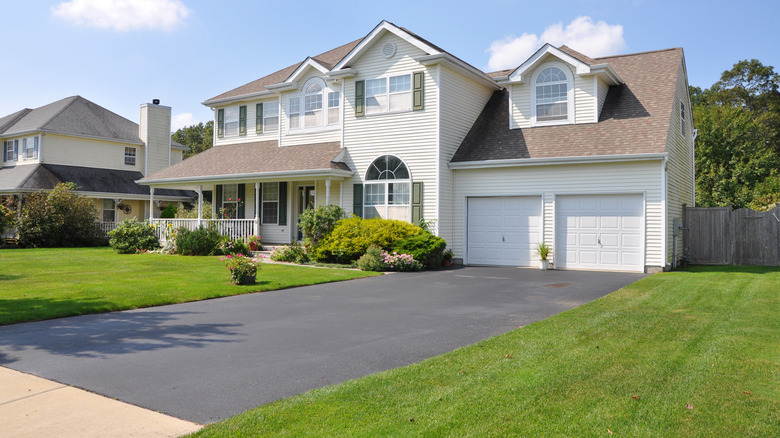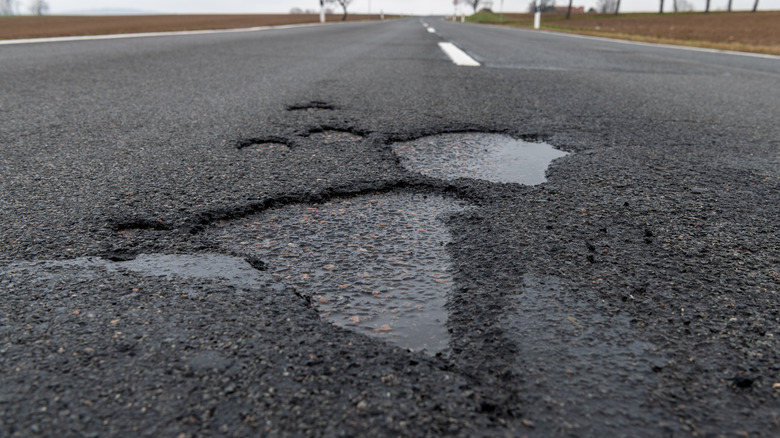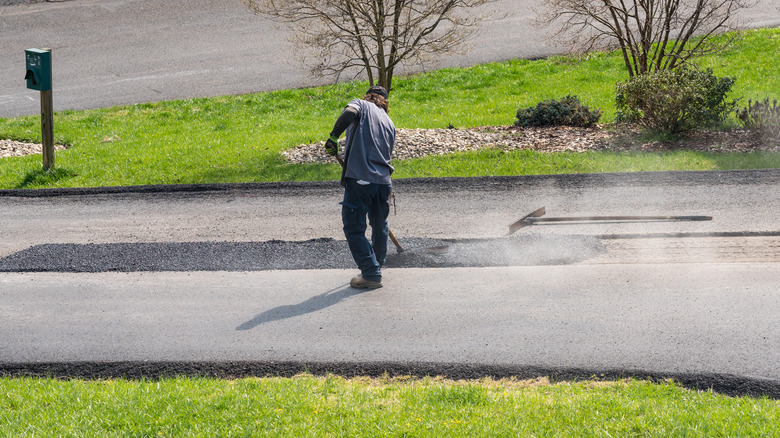Asphalt Vs. Blacktop: Which Should You Use On Your Driveway?
In popular lingo, the terms asphalt and blacktop are often used interchangeably — but they are not identical. There are differences in their composition and how they are processed, and those variations determine the best applications for each material. As it applies to paving your driveway, blacktop wins the contest over asphalt with the majority of homeowners favoring it as their surface of choice, per homeyou.
Blacktop and asphalt are both mixtures of natural crushed stone and bitumen, a heavy and viscous byproduct of crude oil distillation. The ratio of stones to petroleum in each differs, as do their temperature requirements when heated: 250 degrees Fahrenheit for asphalt, 300 degrees for blacktop, according to BuilderSpace.com. In addition, blacktop contains more stones than asphalt. These characteristics cause blacktop to be less able to bear weight than asphalt. However, it's nonetheless ideal for lighter traffic on sidewalks, outdoor basketball courts, suburban roads ... and driveways.
A blacktop driveway is more economical than an asphalt one for various reasons. Capital Paving notes that blacktop's higher stone content makes it less expensive. Blacktop is also more pliable than asphalt, making it less vulnerable to cracking. The sparkling quality of blacktop's surface lends itself to an attractive residential driveway, and the rougher nature of its surface makes it less hazardous than slippery asphalt when walking in icy winter conditions.
Blacktop is better for driveways than asphalt
A blacktop driveway is easer to repair than its counterpart, and Burnaby Blacktop describes it as a more "customer-friendly" surface. Whereas asphalt requires an inevitable cycle of sealing and resealing, blacktop's denser and stronger bond — the result of containing more stones and forming at a higher temperature — makes this type of maintenance less frequent, according to Willie's Paving. Blacktop is also more bendable than asphalt and capable of stretching, both of which factor into fewer repairs.
Paving Finder estimates that the average paving cost for a driveway is $3,600, depending on the driveway layout, its placement on the property, regional pricing factors, and the amount of extra work necessitated. In any case, they consider blacktop to be the thriftier choice. It can be installed quicker and, therefore, with lower labor charges. Fewer future repairs and less maintenance result in money saved. Furthermore, a blacktop driveway can last as long as 30 years.
Asphalt has another weakness in comparison to blacktop. When exposed to strong sun, it can become damaged and break down, potentially resulting in a dark residue left on carpets, shoes, or clothing. On the other hand, per the Washington Post, the additional stones and sand in blacktop make its surface impervious to the effects of UV rays.
Tips for blacktop maintenance and installation
Richfield Blacktop reports that the thickness and the degree to which the weight-bearing sub-surface of a blacktop is compressed, are crucial factors in a driveway remaining maintenance-free. Before laying down the blacktop, the underlying area needs to be fully prepped to ensure the surface's longevity and quality, per Cactus Asphalt. Any original paving material needs to be removed. The surface must be graded properly for drainage purposes, as water can be a primary contributor to driveway damage. Extreme weather changes are also detrimental to driveways, including those covered with blacktop. Newly applied pavement should dry and cure for up to 48 hours before driving (or walking) on it. A long-term maintenance tip is to avoid parking on the same spot every time, and try to park leaking vehicles elsewhere.
Blacktop and asphalt are both reliable, time-tested, and durable surfaces, ideal for their respective purposes. Its ability to withstand great weight makes asphalt an appropriate surface for highways and airport runways, and it is useful for pool linings, soundproofing, and waterproofing. Flexible asphalt roofing tiles are seen everywhere.
In contrast to asphalt, blacktop's use is confined only to paving projects. It may lack the versatility of asphalt, and it's not appropriate for freeway use, but blacktop is the perfect surface for our less heavily traveled byways, paths, and game courts. As a driveway material, blacktop is superior to concrete, gravel, pavers, rubber, and yes, asphalt.


